- Home
- Octavia E. Butler
Parable of the Sower Page 4
Parable of the Sower Read online
Page 4
Is that the way it’s going to be, I wonder? Is that the future: Large numbers of people stuck in either President-elect Donner’s version of slavery or Richard Moss’s.
We rode our bikes to the top of River Street past the last neighborhood walls, past the last ragged, unwalled houses, past the last stretch of broken asphalt and rag and stick shacks of squatters and street poor who stare at us in their horrible, empty way, and then higher into the hills along a dirt road. At last we dismounted and walked our bikes down the narrow trail into one of the canyons that we and others use for target practice. It looked all right this time, but we always have to be careful. People use canyons for a lot of things. If we find corpses in one, we stay away from it for a while. Dad tries to shield us from what goes on in the world, but he can’t. Knowing that, he also tries to teach us to shield ourselves.
Most of us have practiced at home with BB guns on homemade targets or on squirrel and bird targets. I’ve done all that. My aim is good, but I don’t like it with the birds and squirrels. Dad was the one who insisted on my learning to shoot them. He said moving targets would be good for my aim. I think there was more to it than that. I think he wanted to see whether or not I could do it—whether shooting a bird or a squirrel would trigger my hyperempathy
It didn’t, quite. I didn’t like it, but it wasn’t painful. It felt like a big, soft, strange ghost blow, like getting hit with a huge ball of air, but with no coolness, no feeling of wind. The blow, though still soft, was a little harder with squirrels and sometimes rats than with birds. All three had to be killed, though. They ate our food or ruined it. Tree-crops were their special victims: Peaches, plums, figs, persimmons, nuts… And crops like strawberries, blackberries, grapes… Whatever we planted, if they could get at it, they would. Birds are particular pests because they can fly in, yet I like them. I envy their ability to fly. Sometimes I get up and go out at dawn just so I can watch them without anyone scaring them or shooting them. Now that I’m old enough to go target shooting on Saturdays, I don’t intend to shoot any more birds, no matter what Dad says. Besides, just because I can shoot a bird or a squirrel doesn’t mean I could shoot a person—a thief like the ones who robbed Mrs. Sims. I don’t know whether I could do that. And if I did it, I don’t know what would happen to me. Would I die?
It’s my father’s fault that we pay so much attention to guns and shooting. He carries a nine millimeter automatic pistol whenever he leaves the neighborhood. He carries it on his hip where people can see it. He says that discourages mistakes. Armed people do get killed—most often in crossfires or by snipers—but unarmed people get killed a lot more often.
Dad also has a silenced nine millimeter submachine gun. It stays at home with Cory in case something happens there while he’s away. Both guns are German—Heckler & Koch. Dad has never said where he got the submachine gun. It’s illegal, of course, so I don’t blame him. It must have cost a hell of a lot. He’s only had it away from home a few times so he, Cory, and I could get the feel of it. He’ll do the same for the boys when they’re older.
Cory has an old Smith & Wesson .38 revolver that she’s good with. She’s had it since before she married Dad. She loaned that one to me today. Ours aren’t the best or the newest guns in the neighborhood, but they all work. Dad and Cory keep them in good condition. I have to help with that now. And they spend the necessary time on practice and money on ammunition.
At neighborhood association meetings, Dad used to push the adults of every household to own weapons, maintain them, and know how to use them. “Know how to use them so well,” he’s said more than once, “that you’re as able to defend yourself at two A.M. as you are at two P.M.”
At first there were a few neighbors who didn’t like that—older ones who said it was the job of the police to protect them, younger ones who worried that their little children would find their guns, and religious ones who didn’t think a minister of the gospel should need guns. This was several years ago.
“The police,” my father told them, “may be able to avenge you, but they can’t protect you. Things are getting worse. And as for your children… Well, yes, there is risk. But you can put your guns out of their reach while they’re very young, and train them as they grow older. That’s what I mean to do. I believe they’ll have a better chance of growing up if you can protect them.” He paused, stared at the people, then went on. “I have a wife and five children,” he said. “I will pray for them all. I’ll also see to it that they know how to defend themselves. And for as long as I can, I will stand between my family and any intruder.” He paused again. “Now that’s what I have to do. You all do what you have to do.”
By now there are at least two guns in every household. Dad says he suspects that some of them are so well hidden—like Mrs. Sims’ gun—that they wouldn’t be available in an emergency. He’s working on that.
All the kids who attend school at our house get gun handling instruction. Once they’ve passed that and turned fifteen, two or three of the neighborhood adults begin taking them to the hills for target practice. It’s a kind of rite of passage for us. My brother Keith has been whining to go along whenever someone gets a shooting group together, but the age rule is firm.
I worry about the way Keith wants to get his hands on the guns. Dad doesn’t seem to worry, but I do.
There are always a few groups of homeless people and packs of feral dogs living out beyond the last hillside shacks. People and dogs hunt rabbits, possums, squirrels, and each other. Both scavenge whatever dies. The dogs used to belong to people—or their ancestors did. But dogs eat meat. These days, no poor or middle class person who had an edible piece of meat would give it to a dog. Rich people still keep dogs, either because they like them or because they use them to guard estates, enclaves, and businesses. The rich have plenty of other security devices, but the dogs are extra insurance. Dogs scare people.
I did some shooting today, and I was leaning against a boulder, watching others shoot, when I realized there was a dog nearby, watching me. Just one dog—male, yellow-brown, sharp-eared, short-haired. He wasn’t big enough to make a meal of me, and I still had the Smith & Wesson, so while he was looking me over, I took a good look at him. He was lean, but he didn’t look starved. He looked alert and curious. He sniffed the air, and I remembered that dogs were supposed to be oriented more toward scent than sight.
“Look at that,” I said to Joanne Garfield who was standing nearby.
She turned, gasped, and jerked her gun up to aim at the dog. The dog vanished into the dry brush and boulders. Turning, Joanne tried to look everywhere as though she expected to see more dogs stalking us, but there was nothing. She was shaking.
“I’m sorry,” I said. “I didn’t know you were afraid of them.”
She drew a deep breath and looked at the place where the dog had been. “I didn’t know I was either,” she whispered. “I’ve never been so close to one before. I… I wish I had gotten a better look at it.”
At that moment, Aura Moss screamed and fired her fathers Llama automatic.
I pushed away from the boulder and turned to see Aura pointing her gun toward some rocks and babbling.
“It was over there!” she said, her words tumbling over one another. “It was some kind of animal—dirty yellow with big teeth. It had its mouth open. It was huge!”
“You stupid bitch, you almost shot me!” Michael Talcott shouted. I could see now that he had ducked down behind a boulder. He would have been in Aura’s line of fire, but he didn’t seem to be hurt.
“Put your gun away, Aura,” my father said. He kept his voice low, but he was angry. I could see that, whether Aura could or not.
“It was an animal,” she insisted. “A big one. It might still be around.”
“Aura!” My father raised his voice and hardened it.
Aura looked at him, then seemed to realize that she had more than a dog to worry about. She looked at the gun in her hand, frowned, fumbled it safe, and put it back int
o her holster.
“Mike?” my father said.
“I’m okay,” Michael Talcott said. “No thanks to her!”
“It wasn’t my fault,” Aura said, right on cue. “There was an animal. It could have killed you! It was sneaking up on us!”
“I think it was just a dog,” I said. “There was one watching us over here. Joanne moved and it ran away.”
“You should have killed it,” Peter Moss said. “What do you want to do? Wait until it jumps someone.”
“What was it doing?” Jay Garfield asked. “Just watching?”
“That’s all,” I said. “It didn’t look sick or starved. It wasn’t very big. I don’t think it was a danger to anyone here. There are too many of us, and we’re all too big.”
“The thing I saw was huge,” Aura insisted. “It had its mouth open!”
I went over to her because I’d had a sudden thought. “It was panting,” I said. “They pant when they’re hot. It doesn’t mean they’re angry or hungry.” I hesitated, watching her. “You’ve never seen one before, have you?”
She shook her head.
“They’re bold, but they’re not dangerous to a group like this. You don’t have to worry.”
She didn’t look as though she quite believed me, but she seemed to relax a little. The Moss girls were both bullied and sheltered. They were almost never allowed to leave the walls of the neighborhood. They were educated at home by their mothers according to the religion their father had assembled, and they were warned away from the sin and contamination of the rest of the world. I’m surprised that Aura was allowed to come to us for gun handling instruction and target practice. I hope it will be good for her—and I hope the rest of us will survive.
“All of you stay where you are,” Dad said. He glanced at Jay Garfield, then went a short way up among the rocks and scrub oaks to see whether Aura had shot anything. He kept his gun in his hand and the safety off. He was out of our sight for no more than a minute.
He came back with a look on his face that I couldn’t read. “Put your guns away,” he said. “We’re going home.”
“Did I kill it?” Aura demanded.
“No. Get your bikes.” He and Jay Garfield whispered together for a moment, and Jay Garfield sighed. Joanne and I watched them, wondering, knowing we wouldn’t hear anything from them until they were ready to tell us.
“This is not about a dead dog,” Harold Baiter said behind us. Joanne moved back to stand beside him.
“It’s about either a dog pack or a human pack,” I said, “or maybe it’s a corpse.”
It was, as I found out later, a family of corpses: A woman, a little boy of about four years, and a just-born infant, all partly eaten. But Dad didn’t tell me that until we got home. At the canyon, all we knew was that he was upset.
“If there were a corpse around here, we would have smelled it,” Harry said.
“Not if it were fresh,” I countered.
Joanne looked at me and sighed the way her father sighs. “If its that, I wonder where we’ll go shooting next time. I wonder when there’ll be a next time.”
Peter Moss and the Talcott brothers had gotten into an argument over whose fault it was that Aura had almost shot Michael, and Dad had to break it up. Then Dad checked with Aura to see that she was all right. He said a few things to her that I couldn’t hear, and I saw a tear slide down her face. She cries easily. She always has.
Dad walked away from her looking harassed. He led us up the path out of the canyon. We walked our bikes, and we all kept looking around. We could see now that there were other dogs nearby. We were being watched by a big pack. Jay Garfield brought up the rear, guarding our backs.
“He said we should stick together,” Joanne told me. She had seen me looking back at her father.
“You and I?”
“Yeah, and Harry. He said we should look out for one another.”
“I don’t think these dogs are stupid enough or hungry enough to attack us in daylight. They’ll go after some lone street person tonight.”
“Shut up, for godsake.”
The road was narrow going up and out of the canyon. It would have been a bad place to have to fight off dogs. Someone could trip and step off the crumbling edge. Someone could be knocked off the edge by a dog or by one of us. That would mean falling several hundred feet.
Down below, I could hear dogs fighting now. We may have been close to their dens or whatever they lived in. I thought maybe we were just close to what they were feeding on.
“If they come,” my father said in a quiet, even voice, “Freeze, aim, and fire. That will save you. Nothing else will. Freeze, aim, and fire. Keep your eyes open and stay calm.”
I replayed the words in my mind as we went up the switchbacks. No doubt Dad wanted us to replay them. I could see that Aura was still leaking tears and smearing and streaking her face with dirt like a little kid. She was too wrapped up in her own misery and fear to be of much use.
We got almost to the top before anything happened. We were beginning to relax, I think. I hadn’t seen a dog for a while. Then, from the front of our line, we heard three shots.
We all froze, most of, us unable to see what had happened.
“Keep moving,” my father called. “It’s all right. It was just one dog getting too close.”
“Are you okay?” I called.
“Yes,” he said. “Just come on and keep your eyes open.”
One by one, we came abreast of the dog that had been shot and walked past it. It was a bigger, grayer animal than the one I had seen. There was a beauty to it. It looked like pictures I had seen of wolves. It was wedged against a hanging boulder just a few steps up the steep canyon wall from us.
It moved.
I saw its bloody wounds as it twisted. I bit my tongue as the pain I knew it must feel became my pain. What to do? Keep walking? I couldn’t. One more step and I would fall and lie in the dirt, helpless against the pain. Or I might fall into the canyon.
“It’s still alive,” Joanne said behind me. “It’s moving.”
Its forefeet were making little running motions, its claws scraping against the rock.
I thought I would throw up. My belly hurt more and more until I felt skewered through the middle. I leaned on my bike with my left arm. With my right hand, I drew the Smith & Wesson, aimed, and shot the beautiful dog through its head.
I felt the impact of the bullet as a hard, solid blow—something beyond pain. Then I felt the dog die. I saw it jerk, shudder, stretch its body long, then freeze. I saw it die. I felt it die. It went out like a match in a sudden vanishing of pain. Its life flared up, then went out. I went a little numb. Without the bike, I would have collapsed.
People had crowded close before and behind me. I heard them before I could see them clearly.
“It’s dead,” I heard Joanne say “Poor thing.”
“What?” my father demanded. “Another one?”
I managed to focus on him. He must have skirted close to the cliff-edge of the road to have gotten all the way back to us. And he must have run.
“The same one,” I said, managing to straighten up. “It wasn’t dead. We saw it moving.”
“I put three bullets into it,” he said.
“It was moving, Reverend Olamina,” Joanne insisted. “It was suffering. If Lauren hadn’t shot it, someone else would have had to.”
Dad sighed. “Well, it isn’t suffering now. Let’s get out of here.” Then he seemed to realize what Joanne had said. He looked at me. “Are you all right?”
I nodded. I don’t know how I looked. No one was reacting to me as though I looked odd, so I must not have shown much of what I had gone through. I think only Harry Baiter, Curtis Talcott, and Joanne had seen me shoot the dog. I looked at them and Curtis grinned at me. He leaned against his bike and in a slow, lazy motion, he drew an imaginary gun, took careful aim at the dead dog, and fired an imaginary shot.
“Pow,” he said. “Just like she does stuff like
that every day Pow!”
“Let’s go.” My father said.
We began walking up the path again. We left the canyon and made our way down to the street. There were no more dogs.
I walked, then rode in a daze, still not quite free of the dog I had killed. I had felt it die, and yet I had not died. I had felt its pain as though it were a human being. I had felt its life flare and go out, and I was still alive.
Pow.
5
❏ ❏ ❏
Belief
Initiates and guides action—
Or it does nothing.
EARTHSEED: THE BOOKS OF THE LIVING
SUNDAY, MARCH 2, 2025
IT’S RAINING.
We heard last night on the radio that there was a storm sweeping in from the Pacific, but most people didn’t believe it. “We’ll have wind,” Cory said. “Wind and maybe a few drops of rain, or maybe just a little cool weather. That would be welcome. It’s all we’ll get.”
That’s all there has been for six years. I can remember the rain six years ago, water swirling around the back porch, not high enough to come into the house, but high enough to attract my brothers who wanted to play in it. Cory, forever worried about infection, wouldn’t let them. She said they’d be splashing around in a soup of all the waste-water germs we’d been watering our gardens with for years. Maybe she was right, but kids all over the neighborhood covered themselves with mud and earthworms that day, and nothing terrible happened to them.
But that storm was almost tropical—a quick, hard, warm, September rain, the edge of a hurricane that hit Mexico’s Pacific coast. This is a colder, winter storm. It began this morning as people were coming to church.
In the choir we sang rousing old hymns accompanied by Cory’s piano playing and lightning and thunder from outside. It was wonderful. Some people missed part of the sermon, though, because they went home to put out all the barrels, buckets, tubs, and pots they could find to catch the free water. Other went home to put pots and buckets inside where there were leaks in the roof.

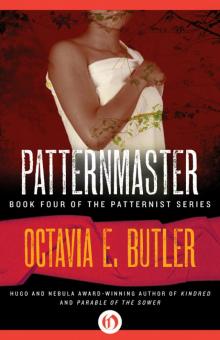 Patternmaster
Patternmaster Survivor
Survivor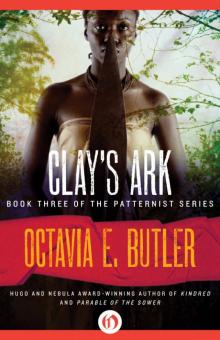 Clay's Ark
Clay's Ark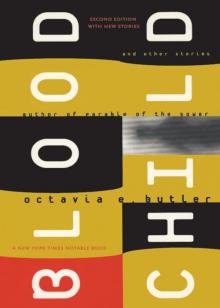 Bloodchild and Other Stories
Bloodchild and Other Stories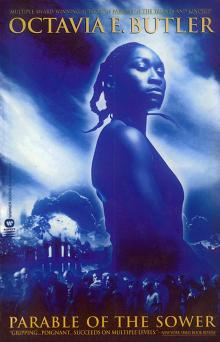 Parable of the Sower
Parable of the Sower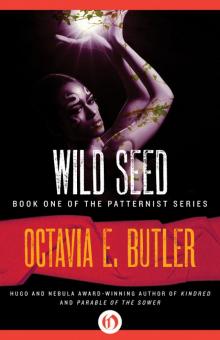 Wild Seed
Wild Seed Fledgling
Fledgling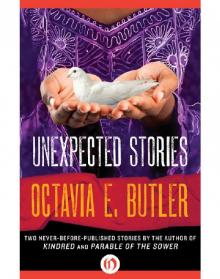 Unexpected Stories
Unexpected Stories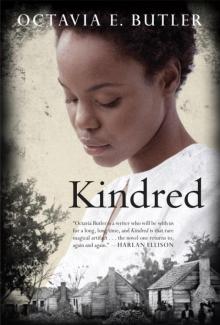 Kindred
Kindred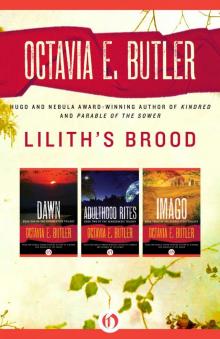 Lilith's Brood: Dawn / Adulthood Rites / Imago
Lilith's Brood: Dawn / Adulthood Rites / Imago Adulthood Rites
Adulthood Rites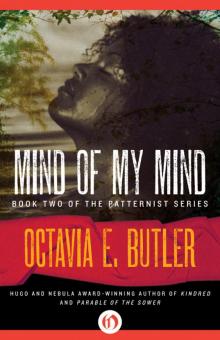 Mind of My Mind
Mind of My Mind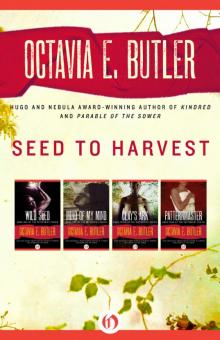 Seed to Harvest
Seed to Harvest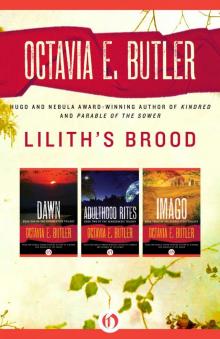 Lilith's Brood: Dawn, Adulthood Rites, and Imago (Xenogenesis Trilogy)
Lilith's Brood: Dawn, Adulthood Rites, and Imago (Xenogenesis Trilogy)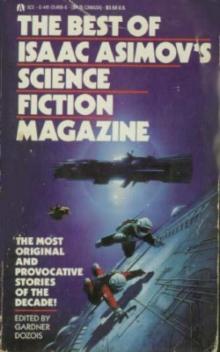 Bloodchild
Bloodchild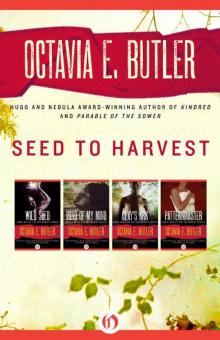 Seed to Harvest: Wild Seed, Mind of My Mind, Clay's Ark, and Patternmaster (Patternist)
Seed to Harvest: Wild Seed, Mind of My Mind, Clay's Ark, and Patternmaster (Patternist)